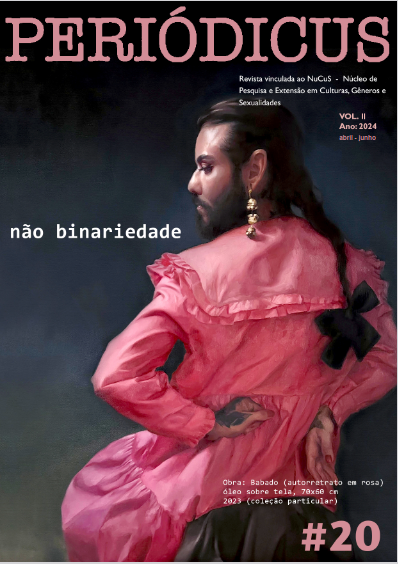Transformations in affirmative action
it is necessary to scratch the razor on the floor
DOI:
https://doi.org/10.9771/peri.v2i20.53142Abstract
This study aims to reflect on the presence/absence of trans people in Brazilian public universities based on the experiences of the team at the Secretaria de Ações Afirmativas, Diversidade e Equidade at a federal university and a trans activist. Our experimental endeavor is motivated by a common place and an intersubjective texture, in which we seek to articulate reflections on documentary data and some studies that we consider relevant in the field of human rights, affirmative actions, as well as the LGBTQIAPN+ community in Brazil, a country world leader in murders of trans people. We outline a survey of universities that indicate offering quotas for trans people and we consider that despite some progress achieved, the aftermath of an anti-gender crusade and a backlash against the rights of these people is evident, which leads us to claim the urgency of affirmative actions for an audience that has historically been neglected in the country's development project.
Downloads
Downloads
Published
How to Cite
Issue
Section
License
Copyright (c) 2024 Thiago Loureiro, Natália Rejane Salim, Ângela Lopes de Almeida, Flávio Adriano Borges Melo, Natália Sevilha Stofel

This work is licensed under a Creative Commons Attribution-NonCommercial 4.0 International License.
Authors who publish in this journal agree to the following terms:
Authors retain copyright and grant the journal the right of first publication, with the work simultaneously licensed under a Creative Commons Attribution Noncommercial License that allows the work to be shared with acknowledgment of authorship and initial publication in this journal, but prohibits commercial use.
Authors are authorized to enter into separate additional contracts for non-exclusive distribution of the version of the work published in this journal (e.g., publishing in an institutional repository or as a book chapter), with acknowledgment of authorship and initial publication in this journal.
Authors are permitted and encouraged to publish and distribute their work online (e.g., in institutional repositories or on their personal website) at any point before or during the editorial process, as this can generate productive changes and increase the impact and citation of the published work (see The Effect of Open Access).








